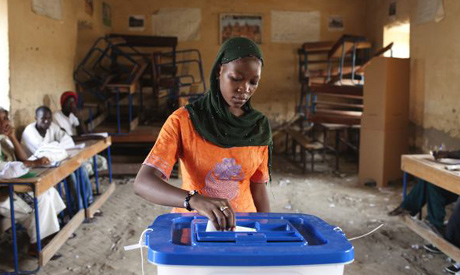
A woman casts her vote during Mali's presidential election in Timbuktu, Mali, July 28, 2013.(Photo: Reuters)
Here is a look at the last 16 months in Mali which is holding a presidential election on Sunday. The vote follows a French-led military intervention from January that expelled Islamist militants who, with Tuareg separatists, had seized the north of the country after a March 2012 coup.
March 22, 2012 - Soldiers seize power from Mali's President Amadou Toumani Toure as a protest against the government's ineffective handling of a campaign against northern rebels. Coup leader Captain Amadou Sanogo says he is ready for talks with rebels but wants to preserve Mali's territorial integrity.
March 30 - Tuareg separatist insurgents enter the key town of Kidal in the north after soldiers abandon positions. Sanogo calls for external help against the rebels, who gradually gain control over the northern half of Mali. One week later on April 6, the rebel group, the Movement for the Liberation of Azawad (MNLA), proclaims independence for northern Mali, which it names Azawad, after announcing an end to fighting.
April 8 - President Toure resigns, paving the way for the soldiers who ousted him to stick by a deal to restore civilian rule and hand power to parliamentary speaker Dioncounda Traore. Traore is sworn in three days later.
April 9 - Members of Mali's Arab community in Timbuktu form the Azawad National Liberation Front, or FLNA, an armed group to fill the void left by the army's retreat from the north.
May 26 - The Tuareg-led MNLA and Islamist militant group Ansar Dine agree to merge and create an independent state in the north. The Tuaregs ditch the pact a week later. Ansar Dine, allied with al Qaeda elements in the Sahel, is one of the main armed groups controlling northern Mali.
Jan 4. 2013 - Ansar Dine says it has suspended a ceasefire agreed with the government the previous month, accusing Bamako of making a mockery of peace talks and gearing up for war.
Jan. 11 - A day after a Malian appeal for urgent help, French President Francois Hollande announces French military intervention to halt advances by the rebels. French air strikes help Malian government troops drive Islamist rebels from the strategic central town of Konna.
Jan. 24 - Ansar Dine splits from its al Qaeda allies and says it wants a truce.
Jan. 27 - French and Malian troops begin to restore government control over Timbuktu, a UNESCO World Heritage site. The French campaign breaks the months-long occupation of northern Mali by al Qaeda-linked groups.
April 25 - The U.N. Security Council unanimously approves the creation of a 12,600-strong peacekeeping force for Mali starting July 1. France has also started withdrawing its 4,000-strong force and plans to have just 1,000 by the end of 2013.
June 18 - Mali signs a ceasefire deal with Tuareg separatist rebels, paving the way for government troops to return to Kidal before the July election. The remote northern town was recaptured by the MNLA in February after Islamists fled.
July 22 - Interim President Traore meets for the first time members of two northern Tuareg separatist groups, provoking anger among many in the south as ethnic tensions rise ahead of the July 28 presidential poll.
Short link: